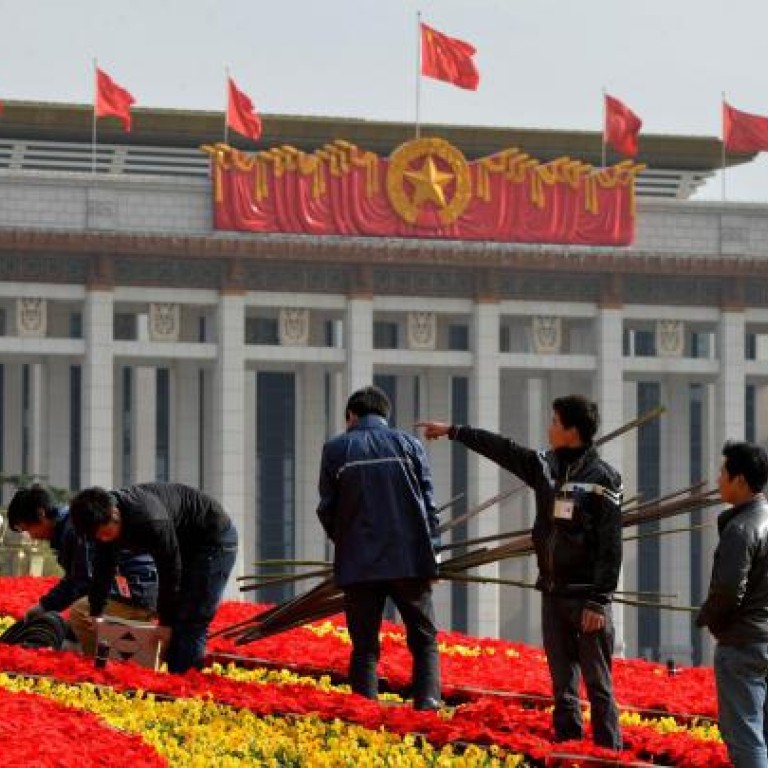
Post-congress leaders likely to shun stimulus in favour of lower growth
Analysts say the post-congress leadership is more likely to concentrate on social stability
To buy or not to buy? This is a question home-buyers often ask themselves - particularly so on the mainland, where abrupt policy changes make timing crucial for investment success.
Two approaches to the question dominate among buyers weighing their options, judging from their postings on mainland social networks: some are waiting for prices to fall, betting on further cooling measures by the new government after the party's 18th congress; while others are snapping up properties on expectations that stimulus measures will be rolled out after the congress and push inflation up.
The week-long congress starts today.
Frenzied speculation surrounding dark horses in the leadership race makes the guessing game more complicated, though analysts say the outcome for economic policy seems assured whoever gets elected, namely no stimulus in the near future and tolerance of lower growth in the next few years to accommodate structural reform.
"However the government may change, the focus will be on social stability," said Kim Eng Tan, sovereign analyst at Standard & Poor's.
"I don't expect a big stimulus unless pushed by severe unemployment."
The government maintains the employment situation has stabilised, with urban registered unemployment measured at 4.1 per cent at the end of September - the same level as the end of June - according to official data released last month.
Kim said the government also likely believed that the most effective way to stimulate the economy was to get banks back into the business of lending, and local governments would be the biggest borrowers.
"Since 2007, banks' asset quality has deteriorated because of the last stimulus, and local governments are highly indebted," he said.
"A stimulus this time would worsen the problems faced by banks and local governments. Thus a high cost is attached to the launch of big measures."
Also, any monetary or credit stimulus will push up inflation, he said, and if home price inflation were to pick up this would generate social instability.
Home buyers making moves in the expectation of big inflationary-boosting measures could be disappointed, if Kim is right.
He sees more modest measures in the offing, including interest rate cuts and another reduction in the required reserve ratio to boost confidence to counter economic slowdown.
Most observers believe the new leaders will be less enthusiastic about significantly boosting investment through aggressive increases in credit supply, such as the massive stimulus programme rolled out by the government during the 2008-2009 global crisis. But some still expect government's spending to increase in the final quarter of the year, particularly in the key areas that Li Keqiang, the upcoming new premier, pledged to support, though probably without a lending binge.
"We think the leadership transition will turn out to be modestly positive for growth. But this won't be noticeable until after the annual legislature meeting in early March next year," said Barclays Capital economists led by Huang Yiping.
The team also cited historical precedent, observing that authorities "tended to loosen monetary and fiscal policies after most party congresses, though sometimes with lags". Fixed-asset investment showed a clear acceleration after each of the past three congresses, while fiscal deficits also increased in most cases, they said.
Economists at Daiwa Securities expect government spending will surge in the current quarter through subsidies and infrastructure investment, which "should make the economic recovery sustainable".
The mainland economy expanded 7.7 per cent in the first three quarters, with growth at a 14-quarter-low of 7.4 per cent from July to September. The target is 7.5 per cent this year.
Daiwa said the gross domestic product growth target could be lowered to 7 per cent for 2013 by policymakers after the party's congress, in a bid to accommodate China's structural reform.
China has relied heavily on investments in polluting and energy-consuming industries to develop its economy in the past decades in the GDP frenzy.
But more recently, environment and resource constraints have made the top leadership recognise the need to follow a more sustainable mode of development by relying more on people's consumption.
China plans to increase investments in education, medical care and other social welfare programmes. However, such measures will take time to show up in GDP growth.
"News flow about potential structural reforms after the leadership change should boost investor confidence in the long run," said Sun Mingchun, Daiwa Securities' chief greater China economist.
Yao Wei, China economist at Societe Generale, said there were "clear signals" from incoming decision makers of their willingness and intentions, along with a high level of internal consensus, to reform economically.
One piece of evidence, he noted, was the State Council think tank's close involvement in a reform handbook.
The was jointly launched by the World Bank and the cabinet's Development and Research Centre in February, and talked about China's challenges in developing a modern, harmonious and creative high-income country.
"We have hopes that the new leaders will succeed, although the progress is unlikely to be smooth," said Sun.
The first testimony to an indication of the new leaders' policy preferences may come shortly after the congress. In December, policymakers will gather at the Central Economic Work Conference to set growth targets for 2013.
"We have no expectations for an investment stimulus announcement, but instead see the possibility that the growth target may be lowered further to 7 per cent from 7.5 per cent," Sun said.

